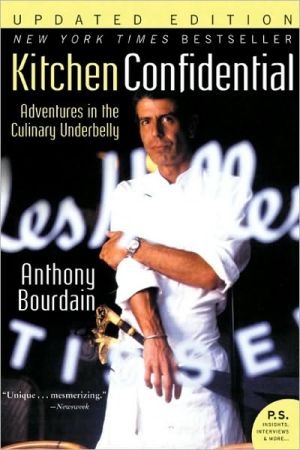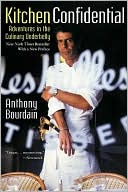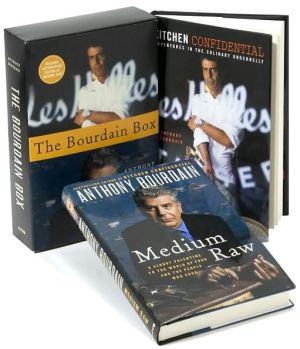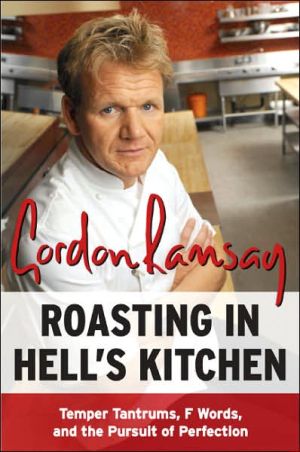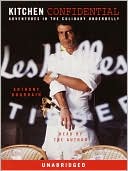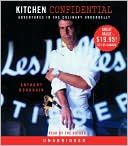Heat: An Amateur's Adventures as Kitchen Slave, Line Cook, Pasta-Maker, and Apprentice to a Dante-Quoting Butcher in Tuscany
From one of our most interesting literary figures – former editor of Granta, former fiction editor at The New Yorker, acclaimed author of Among the Thugs – a sharp, funny, exuberant, close-up account of his headlong plunge into the life of a professional cook.\ Expanding on his James Beard Award-winning New Yorker article, Bill Buford gives us a richly evocative chronicle of his experience as “slave” to Mario Batali in the kitchen of Batali’s three-star New York restaurant, Babbo.\ In a...
Search in google:
From one of our most interesting literary figures former editor of Granta, former fiction editor at The New Yorker, acclaimed author of Among the Thugs a sharp, funny, exuberant, close-up account of his headlong plunge into the life of a professional cook. Expanding on his James Beard Award-winning New Yorker article, Bill Buford gives us a richly evocative chronicle of his experience as slave to Mario Batali in the kitchen of Batali s three-star New York restaurant, Babbo.In a fast-paced, candid narrative, Buford describes three frenetic years of trials and errors, disappointments and triumphs, as he worked his way up the Babbo ladder from kitchen bitch to line cook . . . his relationship with the larger-than-life Batali, whose story he learns as their friendship grows through (and sometimes despite) kitchen encounters and after-work all-nighters . . . and his immersion in the arts of butchery in Northern Italy, of preparing game in London... The Washington Post - Warren Bass In Buford's delightful Heat, Batali is perfectly cast as the ringleader to this kind of circus -- the sort of bruiser who, if he finds a sacred cow, is likely to serve it up medium rare. Chefs are "some of the world's nuttiest people," Buford notes, and Batali rules by sheer force of his personality over the tough, burly crew of eccentrics -- full of curses, bravado and liquor -- who produce Babbo's exquisite food. "Wretched excess is just barely enough," runs one of his mantras; he's Falstaff with a spatula.
The first glimpse I had of what Mario Batali’s friends had described to me as the "myth of Mario" was on a cold Saturday night in January 2002, when I invited him to a birthday dinner. Batali, the chef and co-owner of Babbo, an Italian restaurant in Manhattan, is such a famous and proficient cook that he’s rarely invited to people’s homes for a meal, he told me, and he went out of his way to be a grateful guest. He arrived bearing his own quince-flavored grappa (the rough, distilled end-of-harvest grape juices rendered almost drinkable by the addition of the fruit); a jar of homemade nocino (same principle, but with walnuts); an armful of wine; and a white, dense slab of lardo—literally, the raw "lardy" back of a very fat pig, one he’d cured himself with herbs and salt. I was what might generously be described as an enthusiastic cook, more confident than competent (that is, keen but fundamentally clueless), and to this day I am astonished that I had the nerve to ask over someone of Batali’s reputation, along with six guests who thought they’d have an amusing evening witnessing my humiliation. (Mario was a friend of the birthday friend, so I’d thought --why not invite him, too? -- but when, wonder of wonders, he then accepted and I told my wife, Jessica, she was apoplectic with wonder: "What in the world were you thinking of, inviting a famous chef to our apartment for dinner? Now what are we going to do?")\ In the event, there was little comedy, mainly because Mario didn’t give me a chance. Shortly after my being instructed that only a moron would let his meat rest by wrapping it in foil after cooking it, I cheerfully gave up and let Batali tell me what to do. By then he’d taken over the evening, anyway. Not long into it, he’d cut the lardo into thin slices and, with a startling flourish of intimacy, laid them individually on our tongues, whispering that we needed to let the fat melt in our mouths to appreciate its intensity. The lardo was from a pig that, in the last months of its seven-hundred-and-fifty-pound life, had lived on apples, walnuts, and cream ("The best song sung in the key of pig"), and Mario convinced us that, as the fat dissolved, we’d detect the flavors of the animal’s happy diet—there, in the back of the mouth. No one that evening had knowingly eaten pure fat before ("At the restaurant, I tell the waiters to call it prosciutto bianco"), and by the time Mario had persuaded us to a third helping everyone’s heart was racing. Batali was an impressively dedicated drinker—he mentioned in passing that, on trips to Italy made with his Babbo co-owner, Joe Bastianich, the two of them had been known to put away a case of wine during an evening meal -- and while I don’t think that any of us drank anything like that, we were, by now, very thirsty (the lardo, the salt, the human heat of so much jollity) and, cheered on, found ourselves knocking back more and more. I don’t know. I don’t really remember. There were also the grappa and the nocino, and one of my last images is of Batali at three in the morning -- a stoutly round man with his back dangerously arched, his eyes closed, a long red ponytail swinging rhythmically behind him, an unlit cigarette dangling from his mouth, his red Converse high-tops pounding the floor -- playing air guitar to Neil Young’s "Southern Man." Batali was forty-one, and I remember thinking it had been a long time since I’d seen a grown man play air guitar. He then found the soundtrack for Buena Vista Social Club, tried to salsa with one of the women guests (who promptly fell over a sofa), moved on to her boyfriend, who was unresponsive, put on a Tom Waits CD instead, and sang along as he washed the dishes and swept the floor. He reminded me of an arrangement we’d made for the next day -- when I’d invited Batali to dinner, he’d reciprocated by asking me to join him at a New York Giants football game, tickets courtesy of the commissioner of the NFL, who had just eaten at Babbo—and then disappeared with three of my friends, assuring them that, with his back-of-the-hand knowledge of downtown establishments open until five, he’d find a place to continue the evening. They ended up at Marylou’s in the Village -- in Batali’s description, "A wise guy joint where you can get anything at any time of night, and none of it good."\ It was daylight when Batali got home. I learned this from his building superintendent the next morning, as the two of us tried to get Batali to wake up -- the commissioner’s driver was waiting outside. When Batali finally appeared, forty-five minutes later, he was momentarily perplexed, standing in the doorway of his apartment in his underwear and wondering why I was there, too. (Batali has a remarkable girth, and it was startling to see him clad so.) Then, in minutes, he transformed himself into what I would come to know as the Batali look: the shorts, the clogs, the wraparound sunglasses, the red hair pulled back into its ponytail. One moment, a rotund Clark Kent in his underpants; the next, "Molto Mario"—the clever, many-layered name of his cooking television program, which, in one of its senses, literally means Very Mario (that is, an intensified Mario, an exaggerated Mario)—and a figure whose renown I didn’t appreciate until, as guests of the commissioner, we were allowed onto the field before the game. Fans of the New York Giants are so famously brutish as to be cartoons (bare-chested on a wintry morning or wearing hard hats; in any case, not guys putting in their domestic duty in the kitchen), and I was surprised by how many recognized the ponytailed chef, who stood facing them, arms crossed over his chest, beaming. "Hey, Molto!" they shouted. "What’s cooking, Mario?" "Mario, make me a pasta!" At the time, Molto Mario was shown on afternoons on cable television, and I found a complex picture of the working metropolitan male emerging, one rushing home the moment his shift ended to catch lessons in braising his broccoli rabe and getting just the right forked texture on his homemade orecchiette. I stood back with one of the security people, taking in the spectacle (by now members of the crowd were chanting "Molto, Molto, Molto") -- this very round man, whose manner and dress said, "Dude, where’s the party?"\ "I love this guy," the security man said. "Just lookin’ at him makes me hungry."\ Mario Batali is the most recognized chef in a city with more chefs than any other city in the world. In addition to Batali’s television show -- and his appearances promoting, say, the NASCAR race track in Delaware -- he was simply and energetically omnipresent. It would be safe to say that no New York chef ate more, drank more, and was out and about as much. If you live in New York City, you will see him eventually (sooner, if your evenings get going around two in the morning). With his partner, Joe, Batali also owned two other restaurants, Esca and Lupa, and a shop selling Italian wine, and, when we met, they were talking about opening a pizzeria and buying a vineyard in Tuscany. But Babbo was the heart of their enterprise, crushed into what was originally a nineteenth-century coach house, just off Washington Square, in Greenwich Village. The building was narrow; the space was crowded, jostly, and loud; and the food, studiously Italian, rather than Italian-American, was characterized by an over-the-top flourish that seemed to be expressly Batali’s. People went there in the expectation of excess. Sometimes I wondered if Batali was less a conventional cook than an advocate of a murkier enterprise of stimulating outrageous appetites (whatever they might be) and satisfying them intensely (by whatever means). A friend of mine, who’d once dropped by the bar for a drink and was then fed personally by Batali for the next six hours, went on a diet of soft fruit and water for three days. "This guy knows no middle ground. It’s just excess on a level I’ve never known before -- it’s food and drink, food and drink, food and drink, until you feel you’re on drugs." Chefs who were regular visitors were subjected to extreme versions of what was already an extreme experience. "We’re going to kill him," Batali said to me with maniacal glee as he prepared a meal for a rival who had innocently ordered a seven-course tasting menu, to which Batali added a lethal number of extra courses. The starters (all variations in pig) included lonza (the cured backstrap from the cream-apple-and-walnut herd), coppa (from the shoulder), a fried foot, a porcini mushroom roasted with Batali’s own pancetta (the belly), plus ("for the hell of it") a pasta topped with guanciale (the jowls). This year, Mario was trying out a new motto: "Wretched excess is just barely enough."\ Batali was born in 1960 and grew up outside Seattle: a suburban kid with a solid Leave It to Beaver upbringing. His mother, Marilyn, is En-glish and French Canadian -- from her comes her son’s flaming red hair and a fair, un-Italian complexion. The Italian is from his father, Armandino, the grandson of immigrants who arrived in the 1890s. When Mario was growing up, his father was a well-paid Boeing executive in charge of procuring airplane parts made overseas, and in 1975, after being posted to Europe, to supervise the manufacturing close-up, he moved his family to Spain. That, according to Gina, Mario’s youngest sibling, was when Mario changed. ("He was already pushing the limits.") Madrid, in the post-Franco years (bars with no minimum age, hash hangouts, the world’s oldest profession suddenly legalized), was a place of exhilarating license, and Mario seems to have experienced a little bit of everything on offer. He was caught growing marijuana on the roof of his father’s apartment building (the first incident of what would become a theme—Batali was later expelled from his dorm in college, suspected of dealing, and, later still, there was some trouble in Tijuana that actually landed him in jail). The marijuana association also evokes a memory of the first meals Batali remembers preparing, late-night panini with caramelized locally grown onions, a local cow’s-milk Spanish cheese, and paper-thin slices of chorizo: "The best stoner munch you can imagine; me and my younger brother Dana were just classic stoner kids -- we were so happy."\ By the time Batali returned to the United States in 1978 to attend Rutgers University, in New Jersey, he was determined to get back to Europe ("I wanted to be a Spanish banker—I loved the idea of making a lot of money and living a luxurious life in Madrid"), and his unlikely double major was in business management and Spanish theatre. But after being thrown out of his dorm, Batali got work as a dishwasher at a pizzeria called Stuff Yer Face (in its name alone, destiny was calling), and his life changed. He was promoted to cook, then line cook (working at one "station" in a "line" of stations, making one thing), and then asked to be manager, an offer he turned down. He didn’t want the responsibility; he was having too good a time. The life at Stuff Yer Face was fast (twenty-five years later, he still claims he has the record for the most pizzas made in an hour), sexy ("The most booooootiful waitresses in town"), and very buzzy ("I don’t want to come off as a big druggy, but when a guy comes into the kitchen with a pizza pan turned upside down, covered with lines of crack, how can you say no?"). When, in his junior year, he attended a career conference hosted by representatives from major corporations, Batali realized he had been wrong; he was never going to be a banker. He was going to be a chef.\ "My mother and grandmother had always told me that I should be a cook. In fact, when I was preparing my applications for college, my mother had suggested cooking school. But I said, ‘Ma, that’s too gay. I don’t want to go to cooking school -- that’s for fags.’ " Five years later, Batali was back in Europe, attending the Cordon Bleu in London.\ His father, still overseeing Boeing’s foreign operations, was now based in England. Gina Batali was there, too, and recalls seeing her eldest brother only when she was getting ready for school and he was returning from his all-night escapades after attending classes during the day and then working at a pub. The pub was the Six Bells, on the King’s Road in Chelsea. Mario had been bartending at the so-called American bar ("No idea what I was doing"), when a high-priced dining room opened in the back and a chef was hired to run it, a Yorkshire man named Marco Pierre White. Batali, bored by the pace of cooking school, was hired to be the new chef’s slave.\ Today, Marco Pierre White is regarded as one of the most influential chefs in Britain (as well as the most foul-tempered, most mercurial, and most bullying), and it’s an extraordinary fortuity that these two men, both in their early twenties, found themselves in a tiny pub kitchen together. Batali didn’t understand what he was witnessing: his restaurant experience had been making strombolis in New Brunswick. "I assumed I was seeing what everyone else already knew. I didn’t feel like I was on the cusp of a revolution. And yet, while I had no idea this guy was about to become so famous, I could see he was preparing food from outside the box. He was a genius on the plate. I’d never worked on presentation. I just put shit on the plate." He described White’s making a deep green puree from basil leaves and then a white butter sauce, then swirling the green sauce in one direction, and the white sauce in the other, and drawing a swerving line down the middle of the plate. "I had never seen anyone draw fucking lines with two sauces." White would order Batali to follow him to market ("I was his whipping boy -- ’Yes, master,’ I’d answer, ‘whatever you say, master’ ") and they’d return with game birds or ingredients for some of the most improbable dishes ever to be served in an English pub: écrevisses in a reduced lobster sauce, oysters with caviar, roasted ortolan (a rare, tiny bird served virtually breathing, gulped down, innards and all, like a raw crustacean) -- "the whole menu written out in fucking French."\ -------------------------------------------------------------------------------- Excerpted from Heat by Bill Buford Copyright © 2006 by Bill Buford. Excerpted by permission of Knopf, a division of Random House, Inc. All rights reserved. No part of this excerpt may be reproduced or reprinted without permission in writing from the publisher.
\ From Barnes & NobleAfter spending late nights with British soccer hooligans in Among the Thugs, New Yorker writer Bill Buford now turns to the company of famous chefs and Italian butchers. To learn what "kitchen slaves" really experience, he signed up for a total-immersion apprenticeship with gastronomic superstar Mario Batali. In this briskly paced narrative, Buford takes us behind the swinging doors into Babbo's kitchen; then departs on a transatlantic hunt for secrets about pasta; culinary training; fine cuts of meat; and exquisite gradations of ingredients.\ \ \ \ \ Booklist"Buford's mastery of the stove is exceeded only by his deft handling of English prose."\ \ \ Julia ReedThere is something here for everyone. Anybody who enjoys characters will be drawn into the dramas of the Babbo kitchen cast and especially the antics of the loony Marco Pierre White, whom Buford visits several times. Dinner party cooks will understand the drive toward learning more and the gratification that derives from making other people happy. Those of us in our 40's will certainly understand the allure of re-examining your life and career, not to mention the romance of actually changing it, dramatically. Finally, many of us will also be consumed by jealousy. Heat is a remarkable journey — I only wish I'd thought to make it.\ — The New York Times\ \ \ \ \ Warren BassIn Buford's delightful Heat, Batali is perfectly cast as the ringleader to this kind of circus -- the sort of bruiser who, if he finds a sacred cow, is likely to serve it up medium rare. Chefs are "some of the world's nuttiest people," Buford notes, and Batali rules by sheer force of his personality over the tough, burly crew of eccentrics -- full of curses, bravado and liquor -- who produce Babbo's exquisite food. "Wretched excess is just barely enough," runs one of his mantras; he's Falstaff with a spatula.\ — The Washington Post\ \ \ \ \ Publishers WeeklyBuford's voice echoes the rhythms of his own writing style. Writing about his break from working as a New Yorker editor and learning firsthand about the world of food, Buford guns his reading into hyperspeed when he is jazzed about a particularly tangy anecdote, and plays with his vocal tone and pitch when mimicking others' voices. At its base, Buford's voice is tinged with a jovial lilt, as if he is amused by his life as a "kitchen slave" and by the outsize personalities of the people he meets along the way. Less authoritative than blissfully confused, Buford speaks the way he writes, as a well-informed but never entirely knowledgeable outsider to the world of food love. Listening to his imitation of star chef Mario Batali's kinetic squeal, Buford ably conveys his abiding love for the teachers and companions of his brief, eventful life as a cook. Simultaneous release with the Knopf hardcover. (Reviews, Apr. 3). (May) Copyright 2006 Reed Business Information.\ \ \ \ \ Library JournalPart memoir, part ethnography of a subculture, this engagingly recounts Buford's (Among the Thugs) three years as an apprentice at Babbo, one of Mario Batali's New York City restaurants. Readers familiar with other culinary memoirs will not be surprised by the gritty reality of life in the kitchen, but what sets Buford apart is that he is an outsider, a journalist who is allowed to live among the chefs for a short time. Through his eyes, we see what "heat" truly is and why so many cooks have a penchant for Dante: cooking is hell. The pacing is quick, and the writing often mirrors the intensity of the kitchen. The author's journey transforms him from bumbling peon to competent line cook, from contemplative pasta maker to culturally sensitive apprentice. A well-seasoned cast of characters rounds out this culinary odyssey. A solid addition recommended for most libraries. [See Prepub Alert, LJ 2/1/06.]-Rosemarie Lewis, Broward Cty. P.L., Ft. Lauderdale, FL Copyright 2006 Reed Business Information.\ \ \ \ \ School Library JournalAdult/High School-Could loving to cook translate into being a professional under the tutelage of the famous chef of a three-star New York restaurant? Buford jumped at the chance to find out. This energetic account of his intense culinary education brings readers into the scalding kitchens where fine food is prepared by obsessive chefs for whom timing is critical and cooking is art. The author entwines the history of pasta with his preparation of it, and he visits the theory that it was the Italians who brought fine cooking to France rather than the other way around. Buford follows the example of his mentors as he travels to Italian villages to serve as kitchen slave to a master of pasta-making and as an apprentice to a butcher to learn to perfect that culinary craft. A journalist for the New Yorker, the author writes with the same gusto with which he cooks. Readers learn how physically demanding professional cooking is, how hard it is on the ego, and how satisfying it can be. This is the ultimate career book for would-be chefs, and a book that noncooks will savor until the last word.-Ellen Bell, Amador Valley High School, Pleasanton, CA Copyright 2006 Reed Business Information.\ \ \ \ \ Sara DickermanBecause it's a story that begins from [Buford's] own gangly moment of apprenticeship, rather than a retrospective of a successful cooking career—and because he's a terrific writer—it's one of the most satisfying restaurant memoirs I have read.\ —Slate\ \ \ \ \ Kirkus ReviewsNew Yorker staff writer and obsessed foodie Buford (Among the Thugs, 1992) infiltrates a top chef's kitchen to plumb Italian food as haute cuisine. The author worked as a lowly, often humiliated cooking intern at New York's celebrated Babbo restaurant-the "slave," as he puts it, of chef and partner Mario Batali. Buford sometimes has trouble not stooping to grovel when he brings the American-born, Italian-trained Batali onto the scene, but he nonetheless manages a full portrait of the celebrity chef as occasional paranoid, willful boor and megalomaniacal disciplinarian. The chef frequently assumed a highly visible seat at Babbo's bar, doing no cooking but sipping wine and making sure to be seen while the underlings he had molded labored in the kitchen to fulfill the promise of his innovative menus. Celebrated for personal excesses with food, drink and more, Batali serves as Buford's icon of culinary contradiction, railing against "faggoty French cooking," then, in a pensive lapse, affirming that only women are ultimately capable of "cooking with love." There was plenty for the author to learn as he bungled knife-sharpening, carrot-dicing and other basics, barely tolerated by professional colleagues who were often at each others' throats, all trying to master the art and get their own joints. Buford's experiences at Babbo led him to attempt the delicate art of pasta-making in Italy. Regrettably, his dogged inquiry into the historical transition that led to using eggs instead of water in the dough is a needless drag. After that, he apprenticed himself to a Tuscan butcher, beginning his studies with the pig but moving on to the cow in "graduate butcher school," where he learned the mantra,"It's not the breed. It's the breeding." As he pursues his culinary obsessions, Buford provides an abundance of esoterica on fine Italian cooking, as well as a lot of inside dope on some not-so-savory aspects of selling top-dollar restaurants to the public. Brightly rendered and sophisticated, as befits a New Yorker writer, but very uneven. First printing of 100,000\ \

